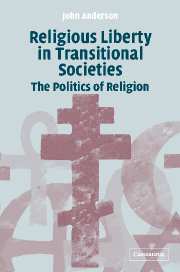Book contents
- Frontmatter
- Contents
- Preface
- 1 Introduction
- 2 Southern Europe: Spain and Greece
- 3 Central and Eastern Europe: Poland and Bulgaria
- 4 The former USSR: Russia and the successor states
- 5 Justifying religious ‘recognition’ and/or discrimination
- 6 Conclusion: culture, conflict, modernisation and religious liberty
- Select bibliography
- Index
6 - Conclusion: culture, conflict, modernisation and religious liberty
Published online by Cambridge University Press: 22 September 2009
- Frontmatter
- Contents
- Preface
- 1 Introduction
- 2 Southern Europe: Spain and Greece
- 3 Central and Eastern Europe: Poland and Bulgaria
- 4 The former USSR: Russia and the successor states
- 5 Justifying religious ‘recognition’ and/or discrimination
- 6 Conclusion: culture, conflict, modernisation and religious liberty
- Select bibliography
- Index
Summary
Our study so far has focused on the place of religion in the life of transitional societies. To that end we have explored two issues: the extent to which ‘traditional’ or ‘national’ religious communities are granted a formal status in the new constitutional and legal order, and how these states handle the issue of religious pluralism. Clearly the issue of constitutional recognition has been more important in some of our cases than in others, and in the Greek case the very overt legal privileging of the Orthodox Church was something that had nothing to do with transition and was inherited from an earlier period. Though some politicians questioned the appropriateness of such definitions during the constitutional debates of the mid-1970s and there have been occasional attempts to raise the question of separation since that time, at present the close formal ties of church and state look set to remain well into the twenty-first century. For the other Orthodox or ‘Oriental’ churches, and indeed for the Muslim countries discussed briefly here, the issue of constitutional status as such has generally proved unimportant. Instead, the issue of ‘recognition’ has come to the fore in discussion of separate laws on religion emerging, with the exception of the Armenian case, in the late 1990s. In Russia, Bulgaria, Kyrgyzstan and Turkmenistan, laws or legal drafts have attempted to carve out a special role for ‘traditional’ religious groups and, to varying degrees, grant them greater rights than those accorded to religious communities categorised as ‘non-traditional’.
- Type
- Chapter
- Information
- Religious Liberty in Transitional SocietiesThe Politics of Religion, pp. 189 - 208Publisher: Cambridge University PressPrint publication year: 2003



